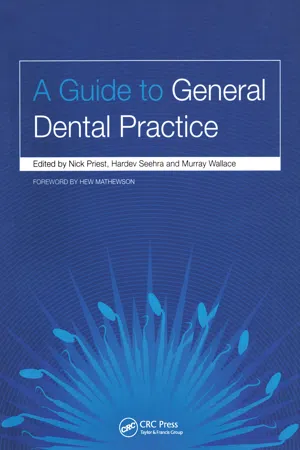
A Guide to General Dental Practice
v. 1, Relationships and Responses
- 176 pages
- English
- ePUB (mobile friendly)
- Available on iOS & Android
A Guide to General Dental Practice
v. 1, Relationships and Responses
About this book
This work includes a foreword By Hew Mathewson, President, General Dental Council. This book is an excellent ready reference for every dental practice to have on hand. Full of practical advice and helpful tips, it offers independent and impartial guidance, especially for new dentists and other staff. It assists competence and provides a thorough understanding of all areas needed for good patient care and professional responsibility. It covers aspects of care including history taking and prescribing, and topics including law, ethics and clinical governance. This completely up to date resource is an essential handbook for all dentistry students and recent vocational training graduates, as well as dental vocational trainers. "Leaving VT to move into practice is an exciting and challenging step and this guide is one of those things you will never know you needed until you cannot find it. It is an incredibly useful collection of information produced by a small group of your colleagues. Until such time as you really need it why not look through it, you will find it helpful and reassuring." - Hew Mathewson, in the Foreword.
Frequently asked questions
- Essential is ideal for learners and professionals who enjoy exploring a wide range of subjects. Access the Essential Library with 800,000+ trusted titles and best-sellers across business, personal growth, and the humanities. Includes unlimited reading time and Standard Read Aloud voice.
- Complete: Perfect for advanced learners and researchers needing full, unrestricted access. Unlock 1.4M+ books across hundreds of subjects, including academic and specialized titles. The Complete Plan also includes advanced features like Premium Read Aloud and Research Assistant.
Please note we cannot support devices running on iOS 13 and Android 7 or earlier. Learn more about using the app.
Information
Section 1
1 Law and ethics
The General Dental Council (GDC)
- Putting patients’ interests first and acting to protect them.
- Respecting patients’ dignity and choices.
- Protecting the confidentiality of patients’ information.
- Co-operating with other members of the dental team and other healthcare colleagues in the interest of the patient.
- Maintaining your professional knowledge and competence.
- Being trustworthy.
The National Clinical Assessment Service (NCAS)
Complaints
Communication
- your patients
- the dental nurse
- the receptionist
- the laboratory
- all other members of the dental team.
- not talking down to patients – treat them as equals
- allowing patients to state their problems, listening and allowing the...
Table of contents
- Cover
- Title Page
- Copyright Page
- Contents
- Foreword
- Preface
- About the editors
- List of contributors
- Section 1
- Section 2
- Section 3
- Section 4
- Section 5
- Section 6
- Section 7
- Section 8
- Index